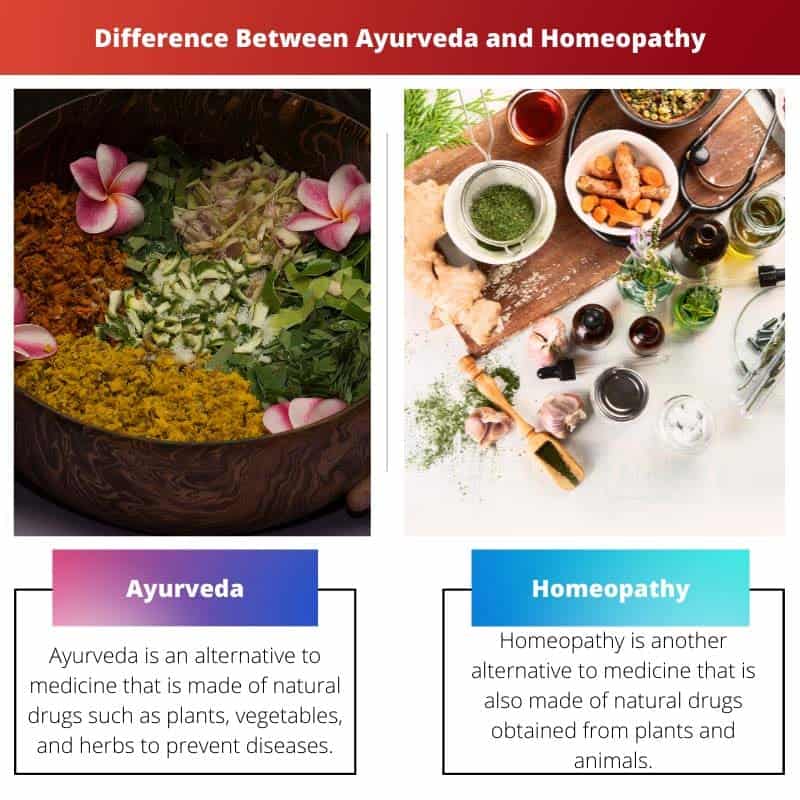Ayurveda and Homeopathy is the practice of medicine that comprises a natural approach to treatment. Both Ayurvedic and Homeopathic medicine system is the healing system that emphasis on prevention and cure of diseases with natural remedies.
While these two medicine systems may seem similar, they have an extremely notable difference between them.
Key Takeaways
- Ayurveda is a holistic approach originating in India, emphasizing prevention and balance; homeopathy is a therapeutic method based on treating “like with like.”
- Ayurveda uses herbal remedies, diet, and lifestyle changes; homeopathy relies on highly diluted substances to stimulate the body’s healing process.
- Ayurveda classifies individuals by body types or “doshas”; homeopathy considers individual symptoms and characteristics for treatment.
Ayurveda vs Homeopathy
Ayurveda is an alternative medicine system made up of herbs, vegetable drugs, and minerals that emphasizes on the prevention of disease. Homeopathy facilitates the cure of the disease. It activates the immune system by exposing it to the symptom-causing substance to make the body resilient to the disease.

Ayurveda is a stand-in form of medicine that is made of natural remedies such as plants, vegetables, medicinal herbs, yoga, and exercise. Ayurveda believes in the prevention of the disease than a cure, moreover, it encourages maintaining a healthy and balanced lifestyle.
Ayurvedic diagnosis is purely based on pulse detection thus, the disease can be easily prevented.
Homeopathy is another form of alternative medicine where the drugs obtained from plants and animals are diluted in alcohol or distilled in water through a natural approach.
Homeopathy believes to cure the disease by activating the body’s immune system to fight against the disease. Homeopathy diagnosis is entirely based on symptoms.
Comparison Table
| Parameters of Comparison | Ayurveda | Homeopathy |
|---|---|---|
| Meaning | Ayurveda is an alternative to medicine that is made of natural drugs such as plants, vegetables, and herbs to prevent diseases. | Homeopathy is another alternative to medicine that is also made of natural drugs obtained from plants and animals which are further diluted in alcohol or distilled in water to cure diseases. |
| History | Founded during the Vedic period in India. | Founded by Samuel Friedrich Hahnemann during the 18th century in Germany. |
| Treatment | The ayurvedic treatment uses natural drugs for both internal and external uses. | The Homeopathic treatment uses natural drugs diluted in alcohol or distilled in water. |
| Diagnosis | Diagnosis is purely based on pulse detection. | Diagnosis is entirely based on symptoms. |
| Belief | Ayurveda believes in the prevention of the disease. | Homeopathy believes to cure the disease. |
| Side effects | Headache, constipation, nausea, and skin rashes. | Fever, headache dry mouth, muscle spasm, and blurred vision. |
What is Ayurveda?
Ayurveda is the ancient traditional medicine system that originated in the Vedic period in India. The Ayurveda is obtained from the Sanskrit words “Ayur”, denoting life, and “Veda”, denoting knowledge or science, as the results together signify as “Science of life.
Ayurveda emphasizes keeping the balance between body, mind, and soul for achieving a healthy lifestyle.
Ayurveda believes that three types of energies as a whole, called doshas, are present in every human being, and it is believed that an imbalance of these energies can cause diseases. Dosha consists of vata, pitta, and kapha.
Vata controls the entire body’s movements and functions. For instance, cell division, heart rate, blood flow, fear, and anxiety are maintained by vata. Pitta controls the digestion and metabolism of the body.
Kapha controls bone development and the immune system. Thus the early detection of these imbalances can effortlessly prevent many diseases.
Ayurvedic treatment depends entirely on natural drugs derived from plants, vegetables, and medicinal herbs for internal and external uses. An Ayurvedic practitioner can prescribe medicines according to vata, pitta, and kapha balances.
Ayurvedic diagnosis is purely dependent on pulse diagnosis. Ayurvedic medicines show mild side effects such as headache and constipation in rare cases.

What is Homeopathy?
Homeopathy is founded by a German physician Samuel Friedrich Hahnemann during the 18th century in Germany.
The name Homeopathy originated from the Greek words “home”, denoting similar or same kind and “pathy”, denoting disease or suffering, hence together, signify “similar suffering”.
Homeopathy emphasises curing the disease by activating the body’s immune system to act as a defence system from diseases.
Homeopathy is medicine is based on three principles that are “like cures like”, “minimum dose”, and “single remedy”.
The first principle, “like cures like”, is similar to the vital response created by the body, thus, it is believed that the immune system automatically activates the defence system, and the diluted medicine together fights against diseases.
In the second principle, “minimum dose”, only a minimum dose is given to proceed with the healing process. These treatments focus on the whole body of the patient rather than an affected area. In the third principle, “single remedy”, a single remedy is prescribed at a time,
During treatment, the homeopathic practitioner creates the patient’s unique symptom illustration to create a prescription of drugs illustration during the healing process. Homeopathic medicines show mild side effects such as fever, headache, dry mouth, and muscle spasms due to heavy dosage.

Main Differences Between Ayurveda and Homeopathy
- Ayurveda is based on the belief in three energies, vata, pitta, and kapha, while Homeopathy is based on three principles that are “like cures like”, “minimum dose”, and “single remedy”.
- Ayurveda believes that an imbalance of Dosha can cause diseases, while Homeopathy believes an imbalance of vital responses can cause diseases.
- Ayurveda prioritizes the prevention and elimination of diseases permanently, while Homeopathy emphasises the cure of the diseases.
- Ayurveda comprises natural drugs such as plants, vegetables, and herbs, while Homeopathy comprises natural drugs obtained from plants and animals which are diluted in alcohol or distilled in water.
- Ayurvedic diagnosis is based on pulse detection, while Homeopathy diagnosis is based on symptoms.

- https://www.ncbi.nlm.nih.gov/pmc/articles/pmc4660507/
- https://www.ncbi.nlm.nih.gov/pmc/articles/pmc3336620/

The detailed descriptions of Ayurveda and Homeopathy’s origins, beliefs, and treatment methodologies are enlightening. The distinctive features of each system are well-articulated, contributing to a nuanced understanding of alternative medicine.
I fully agree, Dwilkinson. The explanations of doshas in Ayurveda and the unique principles of Homeopathy offer a comprehensive view of these traditional healthcare systems.
I appreciate the detailed comparison table that outlines the distinctions between Ayurveda and Homeopathy across various parameters. It reinforces the uniqueness of each medical system.
Absolutely, Kirsty. The historical and cultural contexts of Ayurveda and Homeopathy, as well as their beliefs and diagnostic methods, offer a holistic understanding of these alternative medicine systems.
The side effects mentioned in the comparison table provide valuable insights into the potential outcomes of Ayurvedic and Homeopathic treatments. Understanding these aspects is crucial for making informed decisions about healthcare.
The article effectively delves into the definitions and key principles of both Ayurveda and Homeopathy. I found the emphasis on natural remedies and the rationale behind each system’s treatment approach to be quite enlightening.
Indeed, Jackson. The principles of ‘like cures like’ and ‘minimum dose’ in Homeopathy provide an interesting perspective on treatment methods that differ from Ayurveda’s approach.
The detailed comparison between Ayurveda and Homeopathy in the article helps elucidate the key differences and distinguishing features of these alternative medicine systems. It is a valuable resource for those seeking to understand natural approaches to health and wellness.
I couldn’t agree more, Kbrown. The article sheds light on the diagnostic techniques, beliefs, and treatments of Ayurveda and Homeopathy, offering a holistic view of their respective philosophies.
The article provides a comprehensive explanation of the differences between Ayurveda and Homeopathy. I appreciate the detailed comparison, especially regarding the parameters of comparison and the underlying beliefs of both systems.
I agree with you, Tanya. The article also highlights the diagnostic techniques used in Ayurveda and Homeopathy, shedding light on the distinctive practices of each system.
The historical context of both medical systems is intriguing. Learning about the origins and founders of Ayurveda and Homeopathy adds depth to the understanding of their principles and methodologies.
The detailed explanations of Ayurveda and Homeopathy, along with the emphasis on their unique diagnostic techniques, are commendable. This article offers a balanced comparison that underscores the merits of both medical systems.
I couldn’t agree more, Tmason. The article has provided valuable insights into the preventive and curative approaches of Ayurveda and Homeopathy, enhancing our understanding of natural medicine systems.
The article effectively conveys the essence of Ayurveda and Homeopathy, providing a clear understanding of the principles, philosophies, and treatment methods of both medical systems. The cultural and historical contexts have been eloquently presented.
The article’s detailed analysis of Ayurveda and Homeopathy is a valuable resource for understanding the principles, beliefs, and practices of these medical systems. It provides an insightful comparison that offers clarity on the distinctive approaches to health and healing in Ayurveda and Homeopathy.
Absolutely, Aaron Williams. The article’s exploration of Ayurvedic and Homeopathic philosophies, along with their unique diagnostic techniques, contributes to a comprehensive understanding of traditional medicine systems.
The comparison of Ayurveda and Homeopathy offers a compelling exploration of these alternative medicine systems. I appreciated the detailed insights into doshas and the unique diagnostic methods that differentiate Ayurveda and Homeopathy, providing a comprehensive understanding of both practices.
Absolutely, Owen81. The article’s comprehensive analysis of Ayurveda and Homeopathy offers a nuanced understanding of their ideologies and treatment methods, enriching our knowledge of traditional medical systems.
The comprehensive and comparative analysis of Ayurveda and Homeopathy is commendable. This article provides a thorough dissection of the fundamental principles and practices of both medical systems, allowing readers to gain an in-depth understanding of these traditional forms of medicine.
Precisely, Hking. The article’s elucidation of the historical context and treatment approaches of Ayurveda and Homeopathy demonstrates the distinct attributes of these traditional healthcare systems.